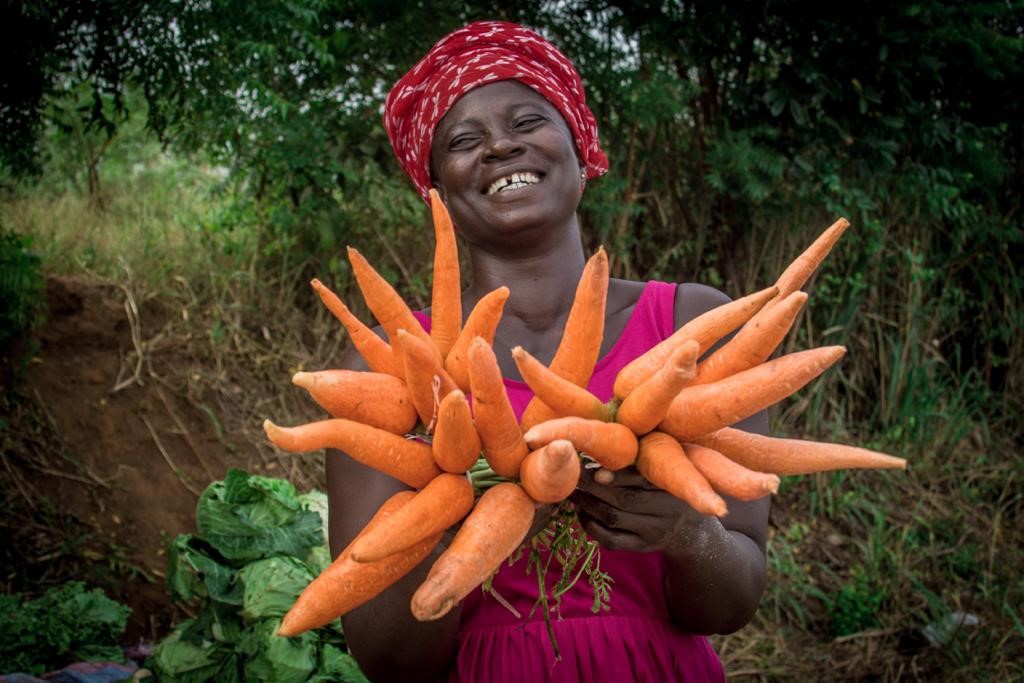Having access to fresh food crops, in many instances stir up significant delight, knowing that the crops are freshly harvested and nutritious. It is always a source of encouragement when you know that your meals will better your health and not deduct from it.
At Agrihouse Foundation, we have this vision in mind for the Ghanaian food consumer, and this intention, informs the various projects and activities we undertake such as, Agricultural Students Career Guidance and Mentorship Dialogues Bootcamp (AG- STUD); Livestock Poultry & Fisheries Trade Show (LiPF); Women in Food and Agricultural Leadership Forum (WOFAGRIC) and Gold in the Soil Awards; International Farmers & Agribusiness’ Resilience and Sustainability Convention (INTAFAC), Annual Pre-Harvest Agribusiness Conference and Exhibitions; The Agrihouse Agri-Woman Market Place; Agri-Watch; 1 household, 1 Garden Initiative (1h,1g).
This year we have a introduced a new innovative interventional project, “Agrihouse Agri-Woman Market Place,” aimed at helping Ghanaian woman farmer, processer, packager, marketer, IT service providers, among others, working within the agric value chain to market their services and products with convenience, both online and directly, in cleaner, safer spaces.
Operating the Agri-Woman Farmers Market Place
The Market Place is both an online and direct marketplace project, aimed at creating and expanding market accessibility for our woman farmer, processer, packager, marketer, and IT service providers, working within the agric value chain. Over the past 8 years, Agrihouse Foundation has consistently been engaging over 50,000 women farmers, processors, service providers, input dealers and other major stakeholders along the value chain by leading initiatives focused on empowerment, leadership, best practices and management training programs that lead to effecting positive change in the mind, field, economy and translate to the community in which we operate or live in.
Through these projects, one reoccurring concern that continues to come up as a big hindrance to women is access to markets. Women Agribusinesses, start-ups, smallholder Farmers who attend our trainings and exhibitions have continuously raised the issues of “limited market access”.
Therefore Agrihouse Agri-Woman Market Place is in direct response to the “call to action” by these women farmers who have continuously urged Agrihouse to create a market platform that will help them to promote, market and sell off their produce from their respective farms, beyond the open markets. We believe this initiative; both the online and direct marketplace will help to mitigate the impact of COVID-19 for the majority of women in Agriculture and Agribusiness. The two phases of the Agrhouse Agri-Woman Market Place are explored below:
The Direct Market Place
This is the physical engagement aspect of the Agri-Woman Marketplace project. The monthly farmers market is designed to take place on the last Friday of every month; bringing together woman farmer, processer, packager, marketer, and IT service providers, working within the agric value chain. Items on display will cut across vegetables, rice shea butter, peanut butter, raw cocoa butter, coconut oil, ginger oil, papaya oil, clove oil, among others. Also, women providing services in Mechanization, Transportation, Digital Marketing, Branding, and Communications will be able to introduce patrons to their products and services.
The Digital Side of Agri-Woman Market Place
We believe an effective digital approach to sales and marketing will considerably mitigate the challenge of access to market faced by our women farmers and agri-processors. Especially in these times, the COVID-19 pandemic has prompted an upsurge in online businesses and marketing; speedily igniting a rethinking and a need to create and develop an Online Marketing Platform, solely focused on Women in Agriculture, agribusinesses, Women agripreneurs and start-ups. The platform is being designed to be free for every woman in the sector, to support and complement their efforts towards farming, Agri-marketing and food security of our country. The platform, when completed will enable our women in agriculture undertake the following opportunities: accessing external market beyond their reach; enabling farmers receive better prices for their produce and gain financial security; support their long-term personal, household and community-level goals; boosting the attention to women in agric as drivers of progress and change; providing farmers with direct outlets for farm products and ensure fair compensation; directly linking producers with consumers allowing people to have a personal connection with their food and the land on which it was produced; making nutritious, affordable, wholesome foods accessible and widely available to community members; and last but not least, reducing post-harvest losses.
To better understand the challenges our women farmers are now grappling with because of the pandemic, we have been interacting with them and listening to their concerns, in the areas of transportation, marketing and sales, education, self-reliance and food security assurance, and limited access.
TRANSPORTATION: A 44-year-old chief district farmer from the Sekyere Central District, in the Ashanti Region, Madam Ohemaa Akyaa representing about 1,700 women in cocoa and maize farming, noted the COVID-19 spread has affected their transportation system, and now causing them to sell produce at no cost at all, to avoid losses. The situation has also affected the accessibility of inputs for farming. Already, they have been facing challenges of little or no access to finance to farming, and it is affecting their entire livelihoods.
INNOVATIVE MARKETING OR NEW SALES APPROACHES: Aunty Ekua Atta, 57 years, also representing a select group of about 870 women farmers in mixed cropping in the Gomoa West District Assembly, emphasized an increasing need for support in training on new markets accessibility approaches and innovative ways of selling, leadership and financial management, training on modern technology, best practices, cooperative structure development, mentorship and training in maintaining food production in crisis.
EDUCATION: Also, Madam Asabea, 62 years, representing 647 women cooperative in cocoa and cashew in the Goaso Municipal and Ahafo region, shared the challenges family farmers are facing since the lockdown of schools, which has brought school-feeding to a halt. She highlighted the need for more education on social distancing for farmers during this crisis and provision of PPEs, capital for production and farming inputs.
SKILLED TRAINING FOR SELF RELIANCE & FOOD SECURITY ASSURANCE: Again, about thirty-two (32) young female student Agronomists and agripreneurs, currently unemployed, spoke of the challenges they are facing to afford a day’s meal and the call for skilled training to support and be useful to their communities, during this time of crisis.
LIMITED ACCESS TO MARKETS: About 500 women Smallholder farmers and processors (the majority in rice parboiling, shea, baobab and Neem) from Bolgatanga, Wa, Tamale and the Brong Ahafo regions of Ghana have always expressed the need for assistance to access ready markets indicating the challenge is not limited to a particular geographical location.
The Challenge of Post-Harvest Losses
Beyond the issue of limited access to market, there is also the challenge of post-harvest losses our Ghanaian women farmers grabble with. Annual food losses have been estimated around 1.3 billion tonnes around the world. The concept of food losses is defined differently. In developed countries, food losses arise at the consumer stage, while in developing countries food losses occur at the post-harvest stages, during marketing and processing.
Post-Harvest Losses
Post-harvest losses are the degradation in both quantity and quality of food productions from harvest to consumption. Post-harvest losses can occur at different stages of harvesting, including, handling at harvesting; threshing loss due to poor technique; transporting and distribution, due to poor transport infrastructure; during storage, as a result of pests and disease attacks and contamination; through primary processing, such as cleaning, classification, hulling, pounding, grinding, soaking, drying, milling, among others; and through secondary processing, such as mixing, cooking, frying, molding and cutting.
Others include, though packaging, as result of inappropriate packaging; marketing, through selling and damages that occur during distribution; and post-consumer poor storage, which includes leaving food to go bad, and poor food preparation or expiration.
The negative impacts of post-harvest losses are severe, causing unfavorable situations such as, unsustainable food supply and value chains; increase in food wastage; poor quality produces; decrease in produce’s shelf-life; unsafe food products for the customers; limited access to nutrient; food limited market opportunities, and poor prices and low farm incomes. Most of these challenges hit women farmers the hardest.
In view of the above challenges, Agrihouse Foundation wants to use this new initiative, Agri-Woman marketplace, to highlight 12th March— a day commemorated globally to create awareness on the negative impacts of Food losses and Food wastage; a situation our women farmers face consistently during harvest seasons. Through Agri-Woman Market, we encourage all women, to unite and say ‘NO’ to Food losses and Food Wastage!
Recommendations
Postharvest losses reduction is less costly relating to increasing in food production in the Pacific region where land and input resources are very limited for agricultural production. Governments, technical universities, value chain’s stakeholders, donors and international development agencies in PICs should work together for postharvest losses reduction in the region by:
Strengthening Research and Development (R&D) institutions: This should be by researching and recommending appropriate agricultural inputs for producing quality produces; studying perishable agricultural produces within the context of its processing and market potential; developing farmers’ friendly maturity indices and recommend appropriate harvest tools and methods and establishing grading, sorting and packing protocols for different commodities.
Improve access to information and capacity building: There should be training on capacity building and working directly with farmers, traders and other value chains’ stakeholders to accept and promote improved post-harvesting practices; encouraging simple agro-processing methods in the villages and establishing regional post-harvest management and losses reduction information networking system.

Improve on farm post-harvest practices: this can be achieved by improving on-farm hygiene and packing practices; supporting small scale farmers in the basic infrastructures (packing house, cool storages) development and helping producers in value adding activities.
Governments’ policies improvement for PHL reduction: support the development and adaption of applicable postharvest management technologies; implement and monitor postharvest management standards (safety, maturity, grading and sorting) for domestic and export markets; develop contract farming and linkages among producers, processors, and traders; make strong collaboration between producers, governments’ agencies (ministry of agriculture, trade etc.), researchers and donors agencies for establishing priority projects and increase public awareness campaigns to reduce postharvest losses in the consumption stages.
Increase investment to develop infrastructures: Build collection centers in the rural areas near production places and equipped with sorting, grading, packaging, sanitation and storage facilities; build roads from farms to collection centers, storages and market places; invest in the processing factories equipped with suitable processing technology, good sanitation system, suitable packaging, and appropriate food safety and quality standards and build market infrastructures and equipped with good storages and sanitation facilities.
Maiden Edition of Agri-Woman Market Place
The maiden edition of the Direct Market Place is scheduled to take place on Friday, March 12, 2021, at the forecourt of the offices of Agrihouse Foundation, Dzorwulu. The Foundation also aims to use the essence of the project to to support Ghanaian women farmers who are striving and excelling in the agricultural sector, as part of celebrating International Women’s Day which fall of March 8, annually. Furthermore, to highlight the ‘International Day of Awareness of Food Loss and Waste,’ commemorated annually on September 29, to highlight the critical need to reduce food loss and wastage around the world, and also, highlighting the issue of post-harvest losses, which is a big challenge in the agricultural sector.
Through this initiative, Agrihouse is championing a community support agriculture transformational program, to drive innovative sales and marketing for women in agriculture. Let’s support our women farmers by purchasing their quality agri-products and fresh food crops. We urge the public to come with your family and your friends, to buy at affordable prices, in support of our women farmers and agri-processors.










